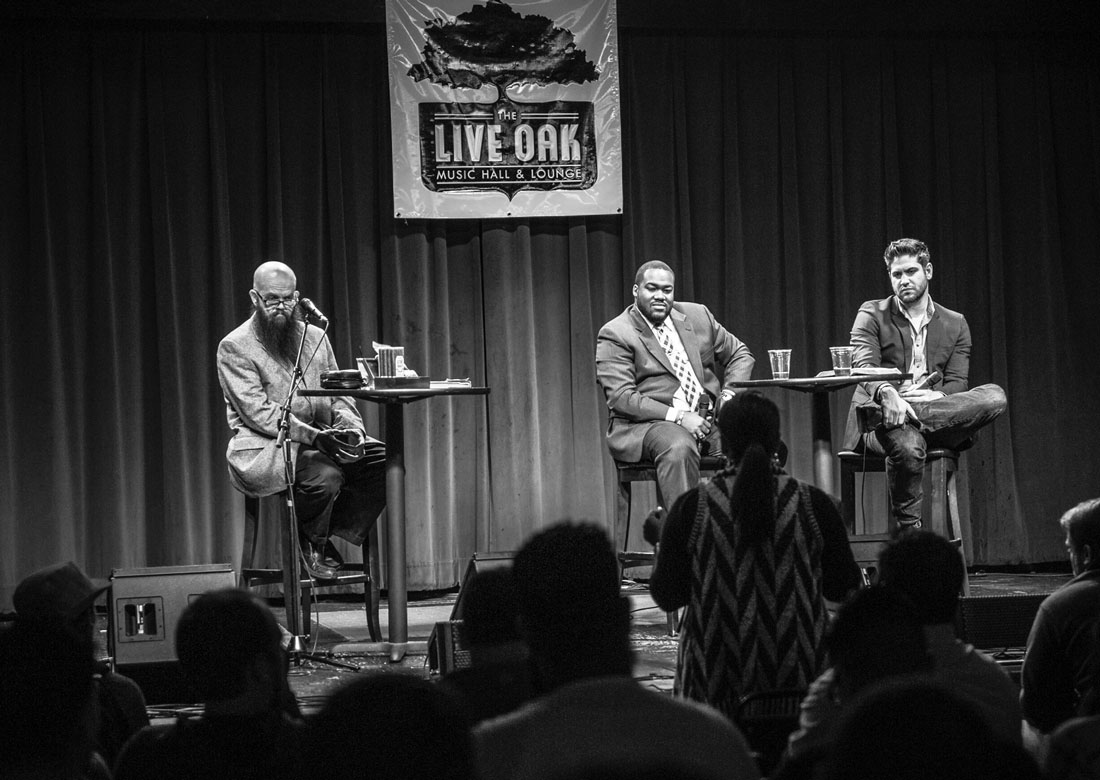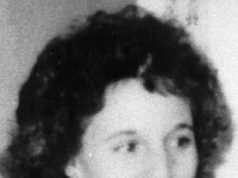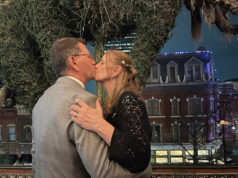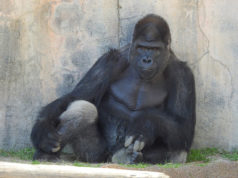It’s not a Bible study group. It’s not a church. The Bible and Beer Consortium gets together once or twice a month to discuss cultural issues from a biblical standpoint, with people from any faith or no faith. And to have a beer or two in the process.
Ezra Boggs, whose regular job is as an analyst at a large call center, started the group two years ago at The Ginger Man on Camp Bowie Boulevard. Since then it’s grown from about 50 people to crowds of 200 and more, at venues as large as the The Live Oak Music Hall & Lounge, off Magnolia Avenue. If Boggs gets his wish, the consortium may someday play to global audiences, in events complete with internet audience participation and merchandise sales.
There’s no church and no preaching but no pulling of rhetorical punches either, Boggs said.
“The focus is on unbelievers, and because of that, we will discuss what churches won’t talk about, what people are talking about in pubs,” he said. “People are already having these discussions, guided by what the culture is actually engaging in. We are not going to have a reiteration of a religious diatribe. We are going to discuss race relations, the abortion debate, or Christianity vs. atheism. It can’t help but be very personal.”
Zachary Moore, who refers to himself at the consortium’s “resident atheist,” said the group “provides a safe space where Christians can come, have their beliefs challenged, and challenge others’ beliefs, all while having a good time with good friends, great beer, and a relaxing smoke if they’re so inclined.” (Tobacco Lane is a sponsor of the group.)
Each session, usually on Sunday, begins with a guest speaker. After that, audience members get up and ask questions to kickstart a discussion that goes wherever the crowd takes it.
“It was really simple at first. It has just snowballed,” Boggs said. The idea was to add other points of view to discussions he was having with friends at the pub.
The first event featured Jim Essian, founder and Lead Pastor of the Paradox Church, comparing “biblical Christianity” and “American Christianity.” Events were publicized at first just by word-of-mouth. Now Boggs and his supporters use social media to get the information out. Besides the Ginger Man pubs in Fort Worth, Southlake, and Plano, the consortium has met at the Prophet Bar in Dallas and at The Live Oak.
Boggs is expecting even bigger crowds when the BBC, as he calls it, starts its annual debate series, one a month beginning in May and lasting into the fall. Topics are chosen based on what people are already talking about, he said.
Moore said the Christianity vs. atheism debates usually draw the largest crowds. He is an early supporter of the group and at one such event discussed why he is an atheist. Alongside was Justin Bass, a professor at the Dallas Theological Seminary and lead pastor at the nondenominational 1042 Church in Frisco, who talked about why he is a Christian.
“There aren’t many venues in DFW controlled by Christians that would consider granting stage time to an atheist, not even if that stage was shared by a pastor,” Moore said. “I should know, because the handful of times that it’s happened here in North Texas, it’s been me on that stage.” But Christians, too, often find it difficult to talk about their beliefs “out in the world, as part of casual conversation,” he said.
Boggs was adamant that atheists should be able to speak for themselves. “Atheists define atheism, and Christians define Christianity,” he said.
There has been criticism about the “beer” part of the Bible and Beer Consortium, he said, but only from people who have never actually attended one of the events. He usually recommends that such critics check out an event before making a judgment.
“Some people just think it’s a drunken frat party. It’s not a prerequisite to drink alcohol. If you’re not called to do this, then don’t do it. But don’t tell me I can’t do it because of your convictions on alcohol,” Boggs said. “Don’t make your convictions someone else’s restrictions.”
He said he gets messages from strangers saying he shouldn’t being hanging out with “these people,” in “these places.” He thinks he’s exactly where he needs to be, bringing the religious discussions to people who wouldn’t necessarily go to a church or be able to have such discussions in church. The consortium’s topics, such as “Race, Religion, and Reconciliation” and “Examining the Fatal Fallacies in the Abortion Debate” wouldn’t be on the agenda in most churches, he said.
Bass, the consortium’s vice president, said that the debate format for events featuring a Christian and a nonbeliever brings in those who wouldn’t come if only one side were addressed.
The consortium is seeking donations and federal non-tax status and has named a board of directors. Boggs hopes to eventually devote himself full time to the BBC.
After a recent event at The Live Oak, the crowd migrated to the roof, where many people lit cigars or pipes. The group’s last two events featured pipe auctions.
Lee Allen, general manager at The Live Oak, said the group brings in a good crowd.
“I think they’re a very interesting group of guys, Ezra in particular. I love what they do,” he said. “Some of our staffers are good friends with him.”
In the early 1990s, Boggs sang with local band Tabula Rasa. Essian, also a consortium board member, said Boggs was a member of the Paradox Church before starting the consortium.
“Ezra is a leader at our church. He has a gift of gathering people in bars, whether through music or through this. We are glad to be a part of it,” Essian said. “It takes a rare guy to pull that off. Ezra … loves atheists and cultural issues. The Bible speaks cross-culturally in a timeless way and can address a lot of issues.”
The minister said he hopes that, in the future, the consortium will address not only hot-button issues like same-sex marriage and abortion but also “issues that aren’t being talked about.”
Essian also spoke at the event on race reconciliation, with Quenton Phillips, a member of the Paradox church, sharing the stage for the question-and-answer session.
The experience was incredible,” Phillips said. “ BBC has opened up a new world in ministry in a setting that hasn’t really been tapped yet.”
Boggs said he wants to take consortium events to other cities and to stream them on the internet, taking questions from anywhere on the globe. Eventually, he said, the group will start selling merchandise.













If I want to hear somebody explain why I’m going to hell, I’ll just go to the church down the street.
What were the topics of debate?